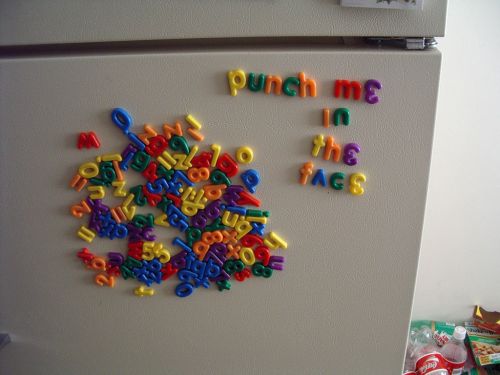The other day, I wrote a post about my particular brand of synesthesia, which per usual whenever I talk about synesthesia, sent me down the internet wormhole of synesthetic research. Every so often, I like to check to see if they’ve come up with new ways to explain my fucked up brain.
I was a synesthete before the internet existed, so for the longest time, I had no idea synesthesia was even a thing or, in fact, that seeing music wasn’t exactly normal. When you tell people that you see music, it causes them to look at you like you just farted out a fully-formed gnome who hits on them in German.

So, like any crazy person, you do some research as to why you have lascivious, German fart-gnomes sprouting from your bunghole, and voilà, synesthesia! There are scientists who study it! You’re not crazy! There are others like you! You’re not alone! Woah, dude.
Except, not so much. I’ve talked to people with other kinds of synesthesia and even some with my sound to visual variety, and it turns out that not one of our experiences is the same. Our synesthesia is only consistent within our own brains, e.g. if you see S as purple, you will always see S as purple, involuntarily, without thinking.
The only synesthete I’ve actually met in person is my sister. She sees letters and numbers as different colors. Her synesthesia benefits her in being a Sudoku master. She can visually see where the numbers are supposed to be by which color is missing. Sudoku is so easy for her that it’s almost like cheating. She’s also really good at card games.
My synesthesia doesn’t benefit me at all in daily life. It doesn’t allow me to count cards or have a better memory. It has given me perfect pitch though. I can see when a note is off-key. I have zero musical ability, so perfect pitch is completely wasted on me. I can’t sing worth a damn–a fact made painfully apparent in my own mind whenever I attempt it. If I sing along to the radio, I have to turn the volume way up to drown out my off-color visuals. I know musicians who would trade anything to have my musical perception, but no, I have it instead. Go figure. I am a writer and an artist, which is already two kinds of creativity, so I don’t want to be greedy.
When I was a kid, my mom, a pianist and singer, forced me to sign up for band class. I was awful at it. I couldn’t read music. I could follow along with the music and see where my notes were supposed to go, but I had no idea how the notes on the paper translated to the fingering I was supposed to do to achieve that note on the instrument I was forced to master. I survived several years in band by looking at the music when the class played it and matching my own sound to that. So, my synesthesia did help with being able to sound read music, but at the earliest opportunity, I dropped out of band and the world is better for it.
As part of my ‘have they figured out my fucked up brain yet’ research, I watched a fascinating lecture by V.S. Ramachandran. It’s a long lecture and probably completely uninteresting to anyone unless you are fascinated by neuroscience and/or synesthesia like me, but I’m posting the video below anyway. You can also read the paper that the lecture is based on if you’re into that sort of thing. If not, feel free to skip to the next paragraph where I pick up what Rama was puttin’ down.
In the lecture, Ramachandran, first and foremost, discusses how synesthesia is a real thing resulting (they think) from cross-wiring in the brain between geographically close processing centers. He also says that synesthetes are not crazy and it is not just the result of childhood connections, e.g. those colored letter refrigerator magnets.

(wikipedia)
From the paper linked above:
Synaesthesia is purported to be more common in artists, poets and novelists (Dailey et al., 1997; Domino, 1989; Root-Bernstein & Root-Bernstein, 1999). For example, Domino (1989) reports that, in a sample of 358 fine-arts students, 84 (23%) reported experiencing synaesthesia. This incidence is higher than any reported in the literature, suggesting that synaesthesia may be more common among fine-arts students than the population at large.
That’s fascinating to me. Synesthesia is more common among creative people, but is that creativity derived from synesthesia? Does that mean that synesthesia is responsible for my creativity? Had I not been born with this weird cross-wiring, would I not be an artist and writer?
It’s also interesting to me that even though my synesthesia is related to music, I have no musical ability. I’m not the only one though. There are many synesthetic artists, like Kandinsky and Degas, who didn’t have musical talent. Instead, they painted what they saw. I’ve tried to paint what I see, but it’s so difficult since it’s always changing. My synesthetic paintings always look like a muddled mess.
Rama goes on to talk about the link between synesthesia and metaphor. We all have a little synesthetic ability as he describes here:
One thing these groups of people have in common is a remarkable facility linking two seemingly unrelated realms in order to highlight a hidden deep similarity (Root-Bernstein & Root-Bernstein, 1999). When Shakespeare writes ‘It is the East and Juliet is the sun’, our brains instantly understand this. You don’t say, ‘Juliet is the sun. Does that mean she is a glowing ball of fire?’ (Schizophrenics might say this; they often interpret metaphors literally). Instead, your brain instantly forms the right links, ‘She is warm like the sun, nurturing like the sun, radiant like the sun’ and so on.
It’s this synesthetic cross-wiring that allows us to not take metaphors literally, e.g. you probably realize that I don’t literally spawn German fart-gnomes from my tooter. It’s also that cross-wiring that allows us to create metaphors like German fart-gnomes in the first place. So before you go calling me out for having a fucked up thinker, you should know that your seemingly normal gray-stuff is just a little messed up just by virtue of being a human being and not severely schizophrenic.

I think in metaphors all the time. I write a lot of metaphors. I tend to over think in metaphors. I’ve edited sentences where I used two or three in the same sentence to describe the same thing. Sometimes, I actually catch myself using metaphors to describe my metaphors like a meta metaphor.
My metaphors tend to be spot on and more creative than most people’s. I can typically come up with a lickety-split metaphor that perfectly describes something in a completely unrelated and abstract way that makes perfect sense to other people. I’ve often been complemented on my exemplary metaphor construction. I think in abstracts easier than most people can, it seems.
But, until this recent bout of synesthetic research, I didn’t realize just how much of my metaphoryness and general creativity is probably a direct result of synesthesia. It makes me a little sad, since I always thought I was just naturally brilliant, whereas I’m most likely brilliant because of some crossed wiring in my brains. Oh well. Whatever the reason, I’m still brilliant, and that’s really all that matters.
Are you good at writing metaphors?







